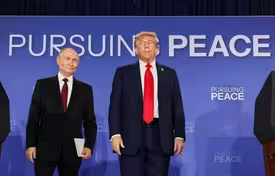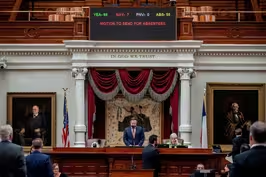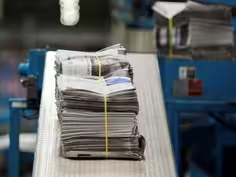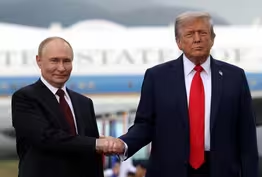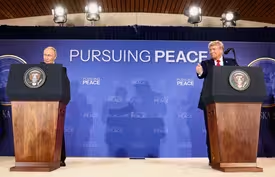
Brooks and Capehart on Trump's summit with Putin
Clip: 8/15/2025 | 10m 21sVideo has Closed Captions
Brooks and Capehart on Trump's summit with Putin
New York Times columnist David Brooks and Jonathan Capehart of MSNBC join Amna Nawaz to discuss the week in politics, including President Trump's summit with Russia's Vladimir Putin in Alaska, Trump's federal takeover of Washington and the battle over redistricting.
Problems playing video? | Closed Captioning Feedback
Problems playing video? | Closed Captioning Feedback
Major corporate funding for the PBS News Hour is provided by BDO, BNSF, Consumer Cellular, American Cruise Lines, and Raymond James. Funding for the PBS NewsHour Weekend is provided by...

Brooks and Capehart on Trump's summit with Putin
Clip: 8/15/2025 | 10m 21sVideo has Closed Captions
New York Times columnist David Brooks and Jonathan Capehart of MSNBC join Amna Nawaz to discuss the week in politics, including President Trump's summit with Russia's Vladimir Putin in Alaska, Trump's federal takeover of Washington and the battle over redistricting.
Problems playing video? | Closed Captioning Feedback
How to Watch PBS News Hour
PBS News Hour is available to stream on pbs.org and the free PBS App, available on iPhone, Apple TV, Android TV, Android smartphones, Amazon Fire TV, Amazon Fire Tablet, Roku, Samsung Smart TV, and Vizio.
Providing Support for PBS.org
Learn Moreabout PBS online sponsorshipAMNA NAWAZ: For analysis of a busy news week that's culminated with President Trump's meeting with Vladimir Putin, we turn now to the analysis of Brooks and Capehart.
That is New York Times columnist David Brooks and Jonathan Capehart of MSNBC.
Good to see you both.
JONATHAN CAPEHART: Hey, Amna.
DAVID BROOKS: Hey.
AMNA NAWAZ: So, this summit we saw between President Trump and Putin, Jonathan, it began with that handshake on the red carpet, a warm greeting between these two men, the first time Putin was met by a major Western leader since the full-scale invasion of Ukraine, and, as you heard Nick report at the top of the show, no clear deliverables out of this summit, no questions taken from reporters either, but progress and agreement to another meeting.
What was accomplished here?
JONATHAN CAPEHART: I don't know.
After looking at the -- well, I was going to say press conference.
It wasn't even a press conference.
But maybe this was the diplomatic equivalent of, could have been an e-mail.
I'm still trying to understand what came out of this meeting.
There was a lot of conversation about, we have agreed to something, and the president's saying that he's going to call NATO and he's going to call Zelenskyy.
Putin's saying he hopes basically the Europeans don't throw a wrench in it.
And yet we still don't know what that is.
And so you fly all that way, at least I was hoping that we would get at least one piece of paper that had the framework of something that they talked about.
AMNA NAWAZ: Yes.
David, as you know, going into these kinds of summits, there's usually a lot of preparation.
That didn't happen in this case., There's usually clear deliverables.
Was this progress, the fact that the summit happened at all?
DAVID BROOKS: No, I don't think it was progress just that it happened.
He gave credibility to a war criminal, so I don't count that as progress.
I must say, this is the weirdest press conference to have to try to comment about, because it was like watching two guys eat salad, and then I'm supposed to say, here's what it means for world history.
Like, they -- like, Vladimir Putin talked like Sarah Palin about how close Alaska is to Russia, and then Trump was making moon eyes at his dear friend Vladimir.
And they talked about sort of agreements, but there was no -- nothing there, as Jonathan said.
The words that leapt out at me -- there was the word agreement there, so maybe there's some agreement.
The word that leapt out at me is what Vladimir Putin said, root causes.
Now, when Vladimir Putin talks about root causes, that is the same demands he's been making since the start of this war.
AMNA NAWAZ: Right.
DAVID BROOKS: He wants territory that his army has not conquered.
He wants to control who runs the regime of Ukraine, no Zelenskyy, no NATO membership, a whole bunch of other stuff, no support for Ukraine.
These are nonnegotiables.
This is not -- there's no peace with these root causes.
So, if he's sticking to the same plans which he has stuck with for all these years, there's no big agreement.
And so the way I read the presser is that they didn't reach an agreement, but they don't want to look like a failure.
And so they're making nice with each other.
They're using these vague words about things, but they have nothing to announce.
And that might not be the worst outcome.
The worst outcome would be that Donald Trump gave away the store or gave away something.
There's no chance Vladimir Putin is giving stuff away.
And so if, it's just a nothing burger, it could have been worse.
AMNA NAWAZ: Jonathan, to that point, you heard Andrew Weiss mention earlier he gives President Trump credit for sticking to his guns, for not, as David said, agreeing to land swaps without Ukraine in the room, for not changing the rhetoric.
And Nick reported earlier sort of this rhetorical roller coaster he's been on for months before this.
But if you're European officials, if you're Ukrainian officials watching all of this, what are you thinking right now?
JONATHAN CAPEHART: What did they talk about?
I mean, even with everything we have been talking about right now, if I were a European leader, if I were the leader of Ukraine, I would be really concerned.
I would want to get on the phone with President Trump and find out, OK, what is going on?
What did you really talk about?
Do we really have to worry that all of that theater was just covering up something really horrendous that you are going to push us into?
And we just -- we just don't know.
DAVID BROOKS: And we're almost imagining that these two guys, who are veteran world leaders, walked up to those microphones and said, we're not going to say anything, and, in 20 minutes, somebody else won't have told the press what's actually happened.
Like, they had to go affirmatively think, we're just going to say nothing, it'll all be marshmallows, and then Trump's going to get on the plane on the way back, he will go back, and he will -- I presume he will tell us a little more of what actually happened.
It's weird to have a press conference where you seem to have intensive -- intensely decided to say, we're going to say nothing.
AMNA NAWAZ: And not take any questions at all.
DAVID BROOKS: Not take any... AMNA NAWAZ: We should underscore that.
JONATHAN CAPEHART: We should also point out that the president did use the opportunity to talk about the so-called Russia hoax and how they talked about how they talked about that again.
AMNA NAWAZ: Several old messages repeated in that.
Lots more to cover in that.
We -- I'm sure we will in the days ahead.
While I have you both, I need to ask you about what's happening back here in the United States and the heating up around these redistricting battles.
We have seen it kick off in Texas.
Democrats there left the state to try to avoid a quorum that would allow gerrymandered maps to go through their pushed through by Republicans that President Trump wants to see.
We have now seen all folks -- all kinds of folks get in on the fight.
President Obama joined a Zoom call with Texas Democrats to praise their fight.
We have seen California Governor Gavin Newsom say that California is going to run its own redistricting plan to counter the Texas effort.
Politico's reporting Kevin McCarthy is reemerging to raise $100 million, he says, to fight the California effort.
And, Jonathan, all this is happening is Californians themselves say they don't want gerrymandered maps.
The majority of people there, some two-thirds, say they want an independent commission to be drawing those congressional lines.
Is this the right move for Democrats right now, or are we just heading to an arms race in redistricting?
JONATHAN CAPEHART: Yes.
The people in that poll... AMNA NAWAZ: Yes to both, to be clear?
JONATHAN CAPEHART: Yes.
They say that now.
I would like to see that poll when we get closer to November, when they have to vote on this.
I think that Governor Newsom is absolutely right to fight fire with fire.
And let's not forget why we're in the situation to begin with.
President Trump told Texas Governor Abbott, I want five more seats out of Texas in order to maintain the Republican majority in the House, in short, steal the 2026 midterm election.
And I think, for a lot of Democrats, this was the one -- this was the moment where they have finally decided that they're not just going to sit back and just let democracy erode on their watch, even though the Texas Democrats are coming back, and they're going to get rolled.
They're not in the majority.
So they're not going to be able to resist what Governor Abbott is doing.
But what Democrats have always wanted was their elected leaders up and down the roster I to fight.
Even if you know you're going to lose, at least show that you are fighting for something that is worth fighting for.
And so I applaud Governor Newsom for doing what he's doing and for those Texas Democrats for standing up for their constituents, but also standing up for democracy.
AMNA NAWAZ: David, as you know, the Democratic argument here is, you can't do anything unless you win, right?
So do what you need to do now by any means necessary, so to speak, to win political power, so you can pass through Democratic agendas and Democratic priorities.
Is this just where we are now?
DAVID BROOKS: I understand the argument.
But let's do a little ethical experiment here.
You're in World War I.
The Germans use mustard gas on civilians, and it helps them.
Do you then decide, OK, we're going to use mustard gas on civilians.
The -- what Trump ordered Abbott to do in Texas is mustard gas on our democracy.
Some people would feel, OK, that was terrible.
We have to fight that.
It's horrible.
It's horrible.
But we're going to fight back.
It's just -- that's war.
Gavin Newsom is leaping into this with both legs.
And, to me, there's a moral stain that will accompany anybody who does this, because basically they are destroying our democracy.
You don't let politicians pick voters.
You let voters pick politicians.
And the people who oppose gerrymandering are -- they're the ones defending democracy.
And so what's going to happen is that we're going to have a race to the bottom we're in the middle of.
And I fully grant you that Trump started it.
So I'm not saying it's totally morally equivalent.
But there's a moral stain.
And what's going to happen is, people are going to say, it's those politicians.
And loss of faith in the system, loss of faith in democracy, and legit -- literally less democracy, because, if you are a Texas voter or a California voter, or if New York does it or if Missouri does it, whoever -- all the states that are going to do this, you are literally disenfranchising people, because you can pick the district so carefully that the voters don't matter so much.
JONATHAN CAPEHART: There's a big difference between what's happening in Texas and what's happening in California.
In Texas, they are rewriting the maps.
Those legislators are rewriting the maps without any input from Texans, from rank-and-file voters in Texas.
In California, the governor is proposing this, but the voters have to go to the polls in November and say that this is something that they want the state to do.
So, California voters have a say in whether they will allow Governor Newsom and the Democratic majorities in the state legislature to fight fire with fire against Texas.
So it is not - - this is not apples to apples here.
AMNA NAWAZ: Is there a more ethical way to gerrymander?
DAVID BROOKS: Yes, get independent districts.
Like, California has a system which is more plebiscite, so they have voters vote.
The -- Texas has -- it's perfectly legitimate, democratic if your state Senate and your state governor pass this thing.
That's part of democracy too.
But it just appalls me that -- we're going to be celebrating the 250th anniversary of the Declaration of Independence, and we're watching it be corroded in front of our eyes.
And it just astounds me that people aren't marching in the streets about this.
People marched in the streets in Ukraine just recently because Volodymyr Zelenskyy tried to concentrate power in his own hands.
And in the middle of a war, they marched against their war leader.
Filipinos, Serbians, people are marching in the streets when you try to take away their own power.
Here, crickets.
AMNA NAWAZ: We will see what happens next.
Jonathan Capehart, David Brooks, always great to see you both.
Thank you so much.
JONATHAN CAPEHART: Thanks, Amna.
DAVID BROOKS: Thank you.
Ex-State Department official analyzes Trump-Putin summit
Video has Closed Captions
Clip: 8/15/2025 | 6m 6s | 'Putin stuck to his guns': Former State Department official analyzes Trump-Putin summit (6m 6s)
News Wrap: Abbott calls 2nd special session in Texas
Video has Closed Captions
Clip: 8/15/2025 | 5m 33s | News Wrap: Abbott calls 2nd second special session for new congressional maps in Texas (5m 33s)
Rural newspapers close in latest blow to local journalism
Video has Closed Captions
Clip: 8/15/2025 | 6m 47s | Dozens of rural newspapers shut down in latest disappearance of local journalism (6m 47s)
Trump, Putin meet with future of Ukraine hanging in balance
Video has Closed Captions
Clip: 8/15/2025 | 4m 54s | Trump meets Putin in Alaska with future of Ukraine war hanging in balance (4m 54s)
What Trump and Putin said – and didn't say – after meeting
Video has Closed Captions
Clip: 8/15/2025 | 3m 15s | What Trump and Putin said – and didn't say – after their meeting in Alaska (3m 15s)
Providing Support for PBS.org
Learn Moreabout PBS online sponsorshipSupport for PBS provided by:
Major corporate funding for the PBS News Hour is provided by BDO, BNSF, Consumer Cellular, American Cruise Lines, and Raymond James. Funding for the PBS NewsHour Weekend is provided by...
